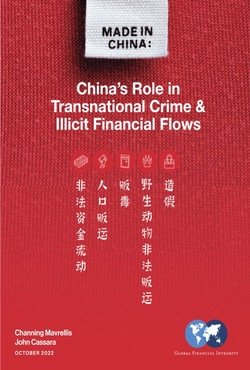Made in China: China’s Role in Transnational Crime and Illicit Financial Flows
By Channing Mavrellis and John Cassara
The People’s Republic of China (PRC or China) plays an extremely impactful role as a source, transit and/or demand country in many of the most widespread and serious transnational crimes. The country is unique in that the government itself engages in certain types of criminal activity—specifically forced labor and intellectual property (IP) rights violations. In addition, the country’s political, economic, and social policies have extensive repercussions on the presence and prevalence of these crimes, both domestically and internationally. Furthermore, the country’s willingness to cooperate and act on these crimes within the global context has been relatively limited. Two important factors to consider when evaluating China’s response to transnational crime are its dynamic, and somewhat forceful, pursuit of development and its authoritarianism. While China has claimed that they have no interest in becoming a global hegemon, there has been no ambiguity about China’s desire to become a geopolitical and economic powerhouse. The country has invested heavily in social and economic development, at home and abroad, and has crafted policies to aggressively support and protect important issues and sectors. At times it has sacrificed potential avenues for improving the efficacy of its fight against different transnational crimes in order to avoid any knock-on impacts that may negatively impact its interests. China is an authoritarian state, and the Chinese Communist Party has significant control over what happens in the country. While there will obviously be actors, such as…..
-
criminals, criminal organizations, and the corrupt, that compete against Beijing’s interests, the government has a monopoly over a fair amount of what happens in the country and the agency to quickly, and severely, respond to undesired actors, activities, and flows, especially in comparison to democratic states. The report’s authors, Channing Mavrellis and John Cassara, scrutinize China’s role in four different transnational crimes—drug trafficking, counterfeiting and IP theft, human trafficking and wildlife trafficking—as well as the illicit financial flows (IFFs) associated with these crimes. It explores the dynamics of these crimes as they relate to China both domestically and internationally; the political, economic, social, and cultural drivers and facilitators to these crimes; laws and regulations related to these crimes; and how the Chinese government has responded to these crimes and IFFs. Finally, the paper provides some focused recommendations for China to improve its response to transnational crimes and IFFs as well as for the U.S.
Washington, DC: Global Financial Integrity, 2022. 113p.


